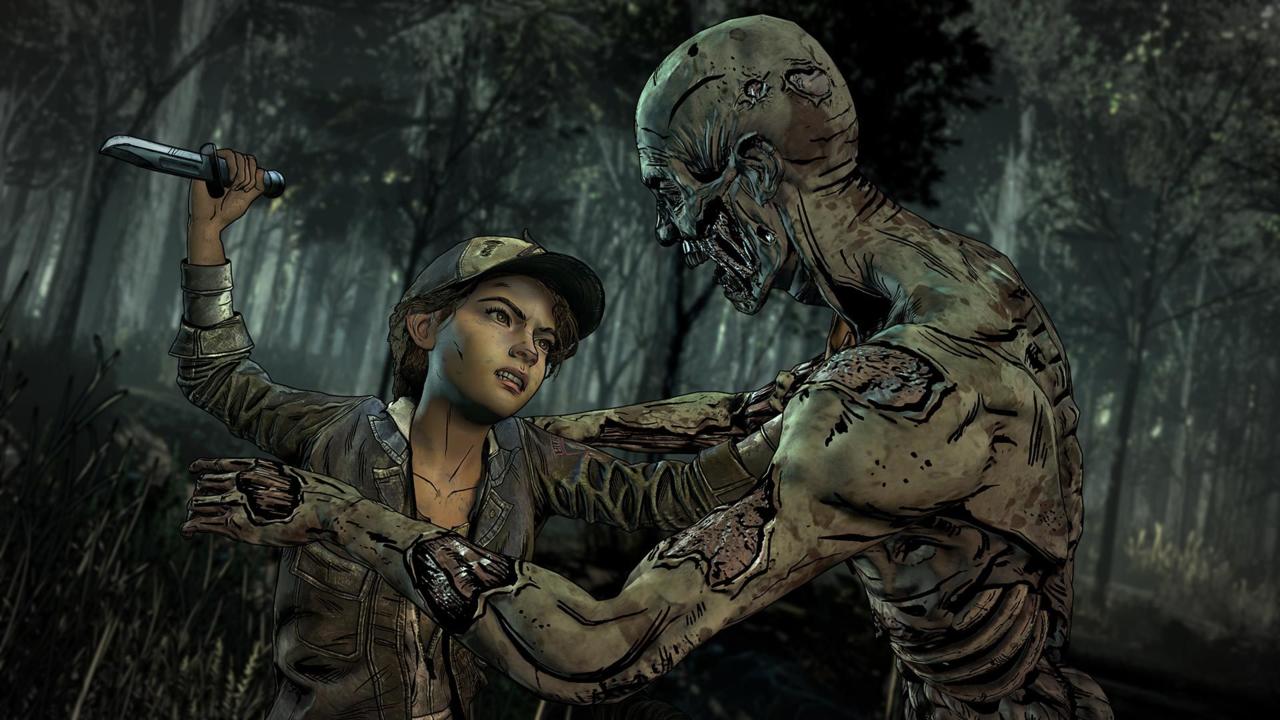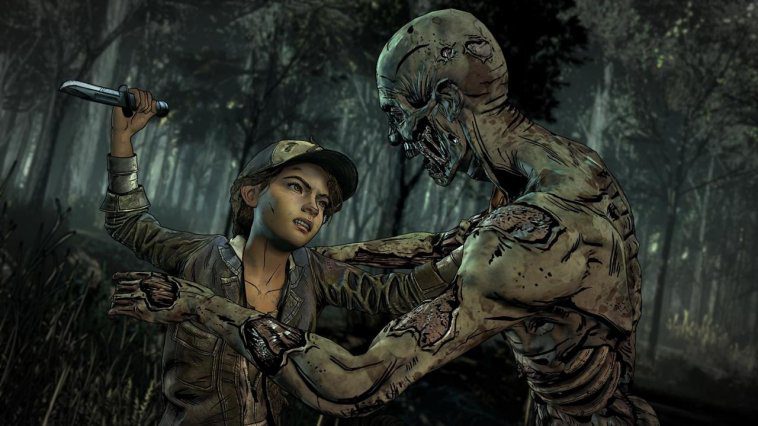Editor’s note: The review contains spoilers for The Walking Dead: A New Frontier. Throughout Telltale’s The Walking Dead, we have seen what living in a zombified hellscape can do to people. The one perpetual ray of hope was in Clementine, the little girl whose soul you’ve been trying to protect since the first hour of the first season, and the character you control in Telltale’s latest chapter. She was one of the depressingly few children left, now forced to grow up in a hostile world of zombies, desperate survivors, treacherous backcountry, deathtrap cities, and, above all, rampant, indiscriminate, ignoble death. We’ve seen, in New Frontier, what this world does to her. It has robbed the music from her voice. She carried the tragedies she has endured like a ball and chain wrapped around her neck.
It’s worth mentioning that sad, storied history to understand just how strangely heartening it is that The Walking Dead’s final season kicks off on a note of… well, hope is a strong word. Acceptance may be closer to the truth. Having known so little else of the world before, Clementine having pushed past her broken, bloody adolescence into early adulthood with her sanity intact may be the greatest blessing Telltale could’ve possibly given her character.
Without a doubt, much of that likely comes down to necessity. While we never see the how of it all, when Done Running begins it is at least six or seven years after the events of A New Frontier and Clementine has found A.J., the ersatz adopted son who was taken away by her authoritarian caretakers in Richmond, Virginia. The episode starts with Clementine behind the wheel of a muscle car, racing through the backroads with A.J. in the backseat. If we didn’t know that walkers could be literally anywhere, it could just be a young mother and their son on a road trip to see family. There are smiles, Clementine jokes around with toys to make A.J. laugh in the face of his hunger, and the trials of figuring out the next move or where the next meal is coming are treated as facts of life rather than crushing burden. Life among the walkers is now a simple truth, and both Clem and A.J. have grown into people who have adjusted accordingly.











The same can be said of Telltale itself, which has also evolved the long-stagnant gameplay of the series. The camera is now fully controllable in action sequences, over Clementine’s shoulder. QTEs are still a core element of gameplay, but you can now face walkers more proactively, walking up and choosing whether to go for a stab to the head directly or target its kneecaps before destroying the head. Walkers that get too close still need to be fought off by spamming an action button, but extra care has to be taken now–if more than one walker catches Clem off guard, it’s game over. Later in the episode, environmental traps can be triggered, which help give Clementine a little more breathing room. While not a problem on PC, there is a little bit of confusion when going from the third-person camera to having to use the classic cursor for certain segments on consoles, and not being able to separately adjust how the camera and cursor control is a missed opportunity. Still, the complaints about Telltale’s games being little more than Dragon’s Lair with branching dialogue have been somewhat muted.
The art style and the graphics have seen a similar once-over, stepping ever-so-slightly away from trying to be a 1:1 translation of the original Walking Dead comics. Character models are handled as usual, save for the updated lighting system introduced in The Walking Dead Collection. However, much of the background details take on a rougher, more abstract nature that grants a beautiful, lurid contrast to the sharper character models in the daytime, and makes the horrors that visit at night even harder to see in the distance. A cellar sequence late in the episode may be one of the most legitimately effective pure horror sequences in the entire series due to lighting that obscure whether a walker is on the other side of the room or literally right behind you.
It’s such a rarity that the responsibilities of motherhood are treated with care and respect in a video game, and the stakes are sky high when so much of Clementine’s motherhood revolves around how to best avoid or deal out death.
The game still plays to Telltale’s greatest strength, which is branching storytelling. The tables have been turned somewhat, however most of Done Running isn’t necessarily about furthering the plot, or creating tense scraps for Clementine to shoot her way out of, but sheer exploration and observation in a unique scenario we’ve never seen in the series. After an encounter with a group of Walkers goes sideways on Clementine and A.J., they convalesce at Ericson Academy, a long-forgotten, isolated, boarding school where the adults are either dead or have abandoned their young charges. Clementine is surrounded, for the first time, by well-written, fully-fleshed out children and teenagers. A couple of them had lives before the walkers, but most don’t. There is no old world for them to miss, as many were too young when the dead started turning to mourn having parents at all.
Much of the dialogue, then, is focused less on deciding how Clementine will survive going forward, but seeing exactly how other kids have adjusted in this insanity and deciding how much she wants to join them. How you’ve played Clementine in the past may determine how much distance you want to put between Clem and this community. Everyone knows what happens to tight-knit groups in this world, and while the kids may have some measure of grace about „the same thing that always happens“ happening to one of their own, it begs the question of how much you want to get invested. One of the big moments of the episode is meeting the leader, Marlon, and his big burly, walker-mauling pit bull named Rosie. Series veterans will remember very, very well what happened the last time Clementine met a dog, and the memory of that horror is all over her face when Rosie appears. Choosing to get over that fear goaded by Marlon’s assertions that she’s a sweetheart of a dog when there aren’t walkers around may very well be one half of the Rosetta Stone to how you should play Clementine for the episode.
The other half, however, is A.J., and it’s in him that much of the tension of the episode and, you can guess, the season will come from. Much of the series thus far has been about you playing caretaker and benefactor over Clementine’s soul, keeping her sane throughout unfathomable terror. A.J., on the other hand, is not only younger than Clementine was when this all started, but hasn’t had nearly as much exposure to people as she did at the same age. And like every young child, A.J. is an information sponge for the world around him.
One of the first prompts you get in game states „A.J. is always listening.“. It’s true. A.J. sees every action Clementine takes, takes everything she tells him as gospel, and generally follows her lead. So much of his life has been just the two of them; however, many of the lessons come back to literally bite them (or, rather, vice versa). Once they arrive at Ericson, A.J. instinctively attacks people who try sneaking up behind him, bites people who approach him the wrong way, and tends to scrounge for materials, not caring whether they belong to someone else. One of the big decisions of the episode is whether to allow him to sleep on the floor their first night, with A.J. explaining that it would help him hide from walkers, and he could help protect Clementine better from a place of safety. It’s a little heartbreaking, and yet, it’s up to you whether that sad fact of his existence is worth breaking knowing that it might come in handy later. A much bigger, more lethal lesson is imparted early on that could majorly turn around on you in the last moments of the episode if you play it a certain way. It’s such a rarity that the responsibilities of motherhood are treated with care and respect in a video game, and the stakes are sky high when so much of Clementine’s motherhood revolves around how to best avoid or deal out death.
The full scope and breadth of The Walking Dead: The Final Season has yet to be laid out, though perhaps the best hint can be found in the game’s fancy, HBO-esque title sequence, showing Clementine and A.J. walking into Ericson, but also showing a silhouetted dead walker rotting away in the front yard, being overtaken by ivy, and, eventually, sprouting a yellow flower. Beautiful things are possible in the new world and the new ways to play that Telltale has laid out in Done Running. But something ugly and horrifying is likely to happen first, and it is going to be captivating to watch.
Website: LINK


